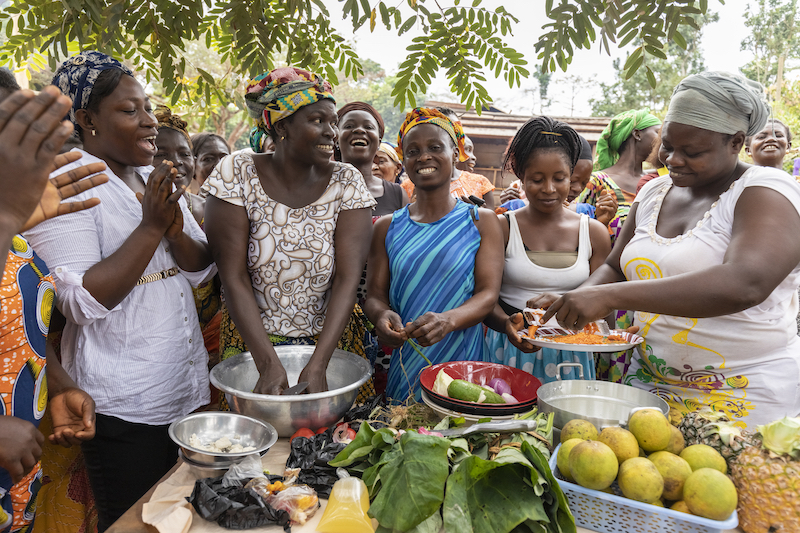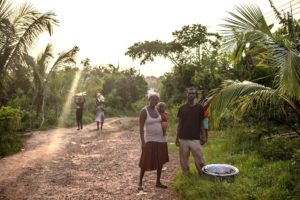Nestlé unveils plans offering farmer payments tackling cocoa sector child labour

Nestlé has moved to enhance its programmes addressing child labour with an income accelerator scheme in Ghana and Ivory Coast offering incentivised payments to farmers and advancing best agricultural practices, reports Neill Barston.
Under the plans revealed in a press launch yesterday, the business said it was aiming to scale up its present activities in support of key producing communities, which included developing regenerative farming programmes and encouraging even greater levels of educational participation for the West African nation’s children. It also aims to significantly empower women within communities to enable them to play an increasing role in financial management and income generation for their respective households.
The extent of this core issue remains considerable, with the most recent industry studies stating that a total of around 1.5 million minors remain exposed to child labour risks across the two countries. This is against a wider backdrop of the industry in which the majority of those working in the sector earn below UN-defined levels of poverty, less than $1 a day, meaning the industry’s predominantly smallholder industry cannot afford to hire farming labourers, meaning young family members are often involved within the sector.
According to reports from Mondelez International at the end of 2020, it found that there was an effectively a $10 billion farmer income gap within West Africa, with the situation worsening in the wake of the report, amid fluctuating cocoa prices and the impacts of Covid-19 on the sector.
This has led to some observers raising the issue that wages in the farming sector should be significantly higher, with some in the farming community believing that payment would need to rise by about three times present rates in order to earn a living wage.
In its response, Nestle’s is delivering cash incentive amounting to CHF 500 a year in the initial two years of the scheme, will be paid directly to cocoa-farming households for certain activities such as enrollment of children in school and pruning among several others.
The company’s plan also supports the company’s work to transform its global sourcing of cocoa to achieve full traceability and segregation for its cocoa products. As Nestlé continues to expand its cocoa sustainability efforts, the company plans to invest a total of CHF 1.3 billion by 2030, more than tripling its current annual investment.
As part of the firm’s online launch of its initiative, there was a keynote speech from Patrick Achi, Prime Minister of Ivory Coast, as well as CEO of Nestle, Mark Schneider, who said the company must look with ‘hope and humility’ at delivering renewed action against child labour which remains a prominent issue facing the industry.
The CEO noted that he believed key progress was being made from personal experience witnessing it on the ground within cocoa communities, though he acknowledged the major scale still facing these communities.
During the presentation, farming cooperatives offered a direct opinion on the state of conditions in Ghana and West Africa, with farmers raising a number of concerns including levels of payment, poor availability of labourers for the sector, as well as facing issues of land being used for illegal mining, which further reduced their farming opportunities.
Alex Assanvo, executive secretary, Cocoa initiative Côte d’Ivoire-Ghana, also spoke at the presentation, having recently taken up his key role delivering support to cocoa communities.

He said: “Many farmers in the region don’t earn enough to solve their own problems, and there are many social issues related to poverty, so it’s important for us to consider all these aspects of the issue- the economic aspects are very serious. But I think these proposals (from Nestle), will help the situation, but we also need to look at the problem of how farmers have had problems accessing finance, as well as how we can encourage them to earn enough to support their families.’
For her part, Kate Clancy, head of Sustainability for Cargill, which works as a key supplier to Nestle, also welcomed the initiative, which she felt was well aligned with its own goals and targets for tackling child labour.
However, she noted that ‘to earn a living income is going to be challenging for many farmers’ in the region, given present conditions, though she remained hopeful that the combined efforts of governments, NGOs and the collective efforts of industry to provide support would prove effective. She highlighted that providing assistance for farming diversification and supporting the empowerment of women within communities was vital to the success of such efforts.
The income accelerator program offers a novel approach to help support farmers and their families in their transition to more sustainable cocoa farming. The incentives will encourage behaviours and agricultural practices that are designed to steadily build social and economic resilience over time. With Nestlé’s new approach, cocoa-farming families will now be rewarded not only for the quantity and quality of cocoa beans they produce but also for the benefits they provide to the environment and local communities.
These incentives are on top of the premium introduced by the governments of Côte d’Ivoire and Ghana that Nestlé pays and the premiums Nestlé offers for certified cocoa. This cocoa is independently audited against the Rainforest Alliance Sustainable Agriculture Standard, promoting the social, economic and environmental well-being of farmers and local communities. Cocoa-farming communities face immense challenges, including widespread rural poverty, increasing climate risks and a lack of access to financial services and basic infrastructure like water, health care and education. These complex factors contribute to the risk of child labor on family farms.
Together with partners, including governments, and building on a promising pilot program, Nestlé’s new initiative sharpens focus on these root causes of child labor. “Our goal is to have an additional tangible, positive impact on a growing number of cocoafarming families, especially in areas where poverty is widespread and resources are scarce, and to help close the living income gap they face over time,” said Mark Schneider, Nestlé CEO. “Building on our longstanding efforts to source cocoa sustainably, we will continue to help children go to school, empower women, improve farming methods and facilitate financial resources.
“We believe that, together with governments, NGOs and others in the cocoa industry, we can help improve the lives of cocoa-farming families and give children the chance to learn and grow in the safe and healthy environment they deserve.”
Creating cash incentives to grow income substantially The program rewards practices that increase crop productivity and help secure additional sources of income, which aim to close the gap to living income and help protect children.
By engaging in these practices, families can additionally earn up to CHF 500 annually for the first two years of the programme. The higher incentive at the start will help accelerate the implementation of good agricultural practices to build future impact.

This incentive will then be levelled at CHF 250 thereafter as the program starts delivering tangible results. It is not paid based on the volume of cocoa sold and is inclusive to provide smaller farmers meaningful support, leaving no one behind. In a departure from normal practice, the program also offers financial incentives for the farmer’s spouse, who is typically responsible for household expenses and childcare.
By dividing the payments between the farmer and the spouse, the program helps empower women and improve gender equality
Examples of practices that Nestlé is incentivising include: • School enrollment for all children in the household ages 6-16; • Implementing good agricultural practices, such as pruning, which increase crop productivity; Performing agroforestry activities to increase climate resilience, like planting shade trees; Generating diversified incomes, for example through growing other crops, raising livestock such as chickens, beekeeping or processing other products like cassava.
Payments will be delivered via a secure mobile service transfer that will ensure traceability directly from Nestlé suppliers to the intended recipient. Because cash flow throughout the year is often a challenge, cash incentives will be distributed when they are needed most. Based on feedback from farmers, this includes the back-to-school period and before the rainy season.
Third parties, including International Cocoa Initiative and Rainforest Alliance, will work with Nestlé to monitor participation. Helping farmers implement sustainable, scalable practices Building on the positive results of an initial pilot in 2020 with 1,000 farmers in Ivory, in 2022 Nestlé will expand the program to include 10,000 families in the country, before extending it to Ghana in 2024.
It will then assess the results of that test phase and adapt where necessary, before moving to reach all cocoa-farming families in its global cocoa supply chain by 2030.
Nestlé said it will help ensure farmers have the resources, training and social and financial structures to make lasting changes by: • Enhancing the existing monitoring and remediation system to help identify, prevent and address child labor risk and increase school enrollment; • Offering families training through the Gender Action Learning System and on household financial planning and entrepreneurship; • Organising and training local groups to perform pruning and other beneficial agricultural tasks within a given cooperative each year; • Providing income diversification opportunities for farmers and their spouses; • Helping set up Village Savings and Loans Associations (VSLA), focused on women, to encourage savings and provide loans for small business opportunities.
Feedback and input from farmers and farmer cooperatives, as well as ongoing data collection and evaluation by third parties, will be used to inform, modify and improve the program as it scales up to more communities.
“Our actions can help catalyse change on an important topic that is so close to our hearts. They will drive accountability and transparency across the industry, at a time when customers, employees and communities increasingly expect companies to deliver on their shared values,” said Magdi Batato, executive vice president and head of operations. “By increasing traceability at scale, we will help build consumer trust in our products and respond to the growing demand for responsibly and sustainably sourced cocoa.” Today’s announcement builds on Nestle’s longstanding efforts to tackle child labor risks in cocoa production.
The company has invested in sustainability through the Nestlé Cocoa Plan since 2009. Through a robust monitoring and remediation system instituted since 2012, 149,443 children have been assisted to protect them against the risk of child labor, and 53 schools have been built or refurbished. This system is now the industry standard by which companies monitor their supply chains.
